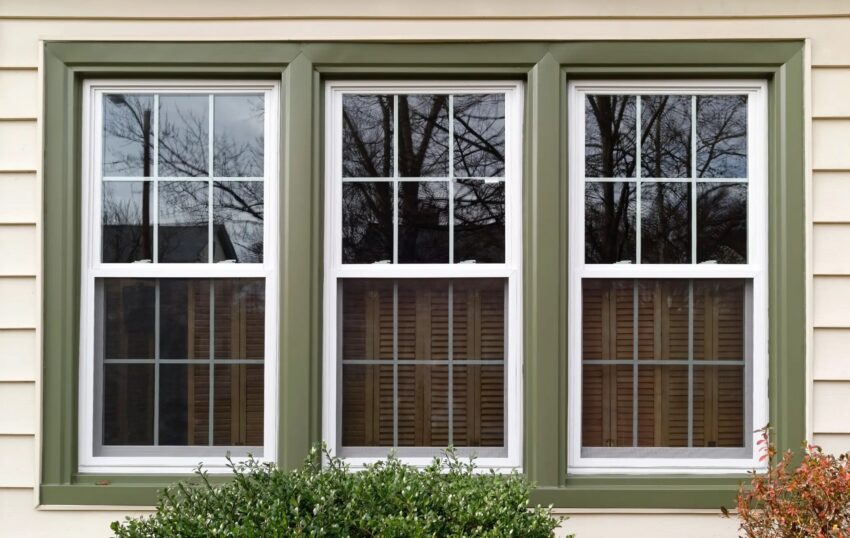The average window replacement cost is $730 per window, with homeowners paying between $450 to $45,000 for a window replacement project. The cost to replace a single window averages between $150 and $1,500, depending on the type of window and how it is installed.
We’re going over the factors that influence the cost of window replacement, including various window types, the difference between DIY and professional installation, and how to tell when it’s time to replace your windows.
The Value Proposition of Window Replacements
Energy-efficient windows help you save money on heating and cooling costs, so it’s vital to have windows that are in good condition. Do new windows pay for themselves in energy savings? The answer may depend on the window replacement cost and the difference between your new and old windows.
If you live in a cold climate, windows with a high Energy Star rating can quickly save you money. And no matter where you live, new windows can make your home more comfortable and aesthetically pleasing as soon as they’re installed.
Factors in Calculating Window Replacement Cost
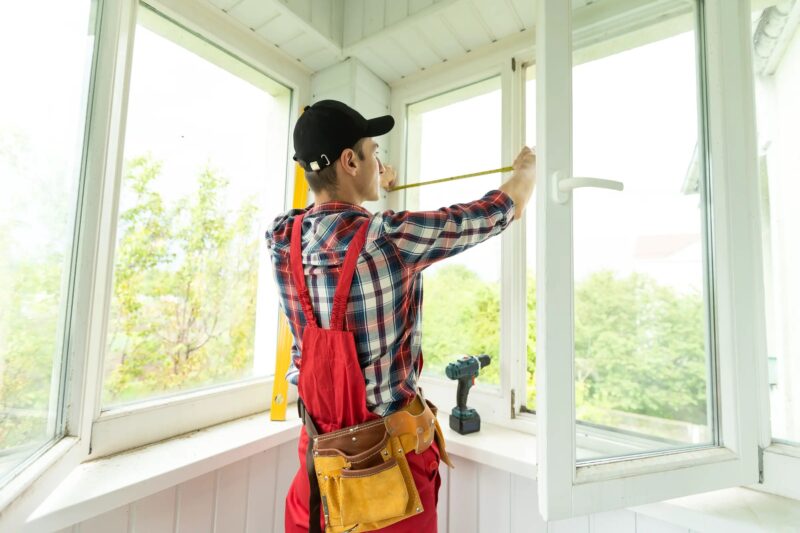
Size and Dimensions of the Window
The size and dimensions of your window help determine the cost of the window. Take a look at these window prices by size and dimension, not including installation:
| Window dimensions | Average cost to replace windows |
| Small (up to 36” either side) | $70 to $255 |
| Medium (up to 48” either side) | $150 to $1,000 |
| Large (greater than 48” either side) | $450 to $3,000 |
Material Used
Windows are made from different materials, including aluminum, vinyl, fiberglass, and wood. Here are the average window replacement costs, not including installation.
| Window materials | Window replacement costs |
| Small aluminum | $65 to $135 |
| Medium aluminum | $150 to $400 |
| Large aluminum | $430 to $530 |
| Small vinyl | $70 to $185 |
| Medium vinyl | $300 to $900 |
| Large vinyl | $1,200 to $1,750 |
| Small fiberglass | $150 to $250 |
| Medium fiberglass | $500 to $1,000 |
| Large fiberglass | $875 to $2,150 |
| Small wood | $185 to $290 |
| Medium wood | $300 to $1,500 |
| Large wood | $950 to $3,000 |
Glazing and Insulation Features
The most inexpensive type of window is a single pane. With various types of glazing, windows are much more energy efficient, and insulation features can make your windows more cost-effective and sound-proof, adding to the comfort of your home.
Windows are glazed in various ways, but the most common types of glazing include:
- Single-pane
- Double-pane
- Triple-pane
- Low emissivity (Low-E)
Sometimes, people confuse glazing features with the sash features. There is a difference between double-pane windows and double-hung windows.
Labor and Installation Complexity
Window installation cost varies, ranging from $150 to $4,000. The cost depends on several factors, such as the labor rates in your region, the size of the window, and the complexity of the installation. For example, large window installations on a second story take longer than small ones on the ground floor.
Additional Costs and Considerations
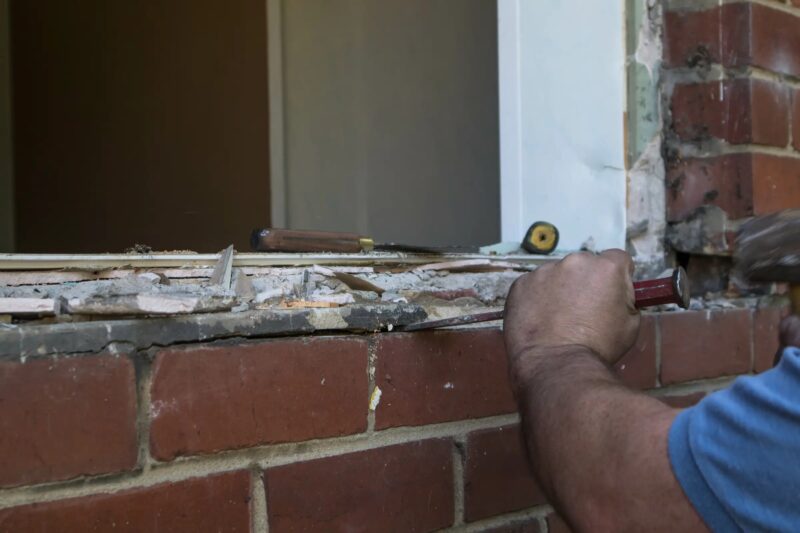
Window Frame Repairs or Replacements
The cost to repair window frames depends on the materials it’s made from, how large the window is, and the extent of the damage. Broken window panes are usually the easiest to repair, but in some cases, it’s smarter to replace a window than repair it.
Minor repairs can be as low as $65 per window, but extensive damage to large windows can be as high as $1,400.
Disposal of Old Windows
When you obtain a quote for window replacement, be sure to inquire about the disposal of old windows. Some contractors will dispose of old windows without charging you extra, while others may charge a fee per window.
Many recycled building material companies will take old windows, and some of them will even pick them up from you for free.
Customizations and Specialty Glass
Custom windows cost an average of 25% to 75% more than standard windows, depending on the customization. Common types of specialty glass include patterned, laminated, and safety glass.
Potential Home Structural Modifications
Replacing a window is usually pretty straightforward. The old window is removed, and a new one of the same size is installed.
However, if you want to install a different size or put a window in a wall where there wasn’t one before, it can cost considerably more to make the structural modifications required, including adding new wall studs and fixing the interior wall and the exterior siding.
Replacement Costs by Window Type

Take a look at the various costs of replacing different types of windows.
Single Hung Windows
Single-hung windows are one of the most common types of windows used in homes in the United States. They consist of two window panes, one of which is fixed in place and another which moves up and down.
Sometimes, single-hung windows are installed horizontally, so they slide open from left to right. However, this often results in moisture issues and isn’t a preferred method in certain climates.
Features and Price Range
The cost to replace a single-hung window averages $150 to $400 per window, depending on the size, materials, and installation costs.
Double Hung Windows
With double-hung windows, both the top and bottom panes can move up and down vertically. They cost more because they have more moving parts and require more materials to produce.
Features and Price Range
The average cost for window replacement for double-hung windows is $200 to $600, depending on the size, materials, and installation costs.
Casement Windows
Casement windows are another popular type of window. They open vertically, often by a hand crank mechanism or on side hinges.
Benefits and Typical Costs
Casement windows allow for full ventilation, so they’re often used in places like over the kitchen sink. The cost to replace or install a casement window is $600 to $1,400, making them one of the more expensive window replacements.
Bay and Bow Windows
Both bay and bow windows project outward from the exterior wall of the home. Bay windows have three sections, while bow windows have multiple sections and are more gracefully curved.
Design Benefits and Cost Factors
Bay and bow windows provide more light within the window structure. They typically offer better views, and they enhance the appearance of your home.
The average cost of bay window replacement is about $2,500. Bow windows are a little more, typically costing about $2,800. However, custom-designed bay and bow windows can cost as much as $13,000, depending on the size, materials, and installation.
Reasons Why You Should Replace Windows
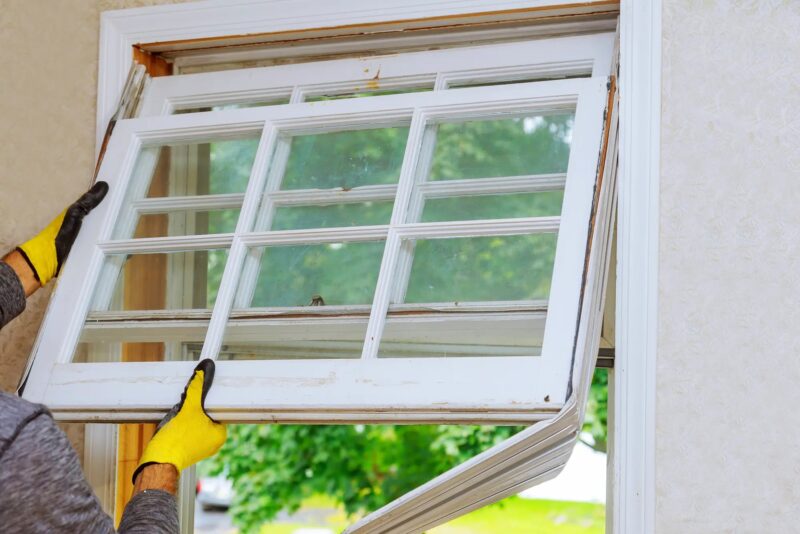
How can you tell when it’s time to replace your windows? On average, the lifespan of a window is 15 to 20 years, but they often need to be replaced or repaired before that.
Energy Efficiency Improvements
Many older windows installed even as recently as 20 years ago are not as energy efficient as windows made today. As technology improves, the energy efficiency ratings of windows continue to increase, and the savings in energy costs are a common reason to replace windows.
Enhancing Home Value and Curb Appeal
New windows are aesthetically pleasing, enhancing your home’s curb appeal and increasing the value of your home. Over time, the color of your windows starts to fade. If they are painted, the chipped or peeled paint can look bad, and replacing your windows is a good way to give your home a fresh, updated look.
Functionality and Operational Issues
Windows start to freeze up when they age, and you may have other operational issues that make them difficult to use. Here are the most common problems with old windows, in terms of functionality:
- Water and air leaks
- Sticky window operation
- Foggy windows
- Damaged frames and screens
- Noise penetration
- Broken panes
Safety and Security Concerns
If your old windows aren’t working correctly, they can make your home more vulnerable to intruders and prevent them from being used as a fire escape.
New windows not only make your home more aesthetically pleasing, but they also provide increased safety and security.
DIY Window Replacement vs. Hiring a Professional
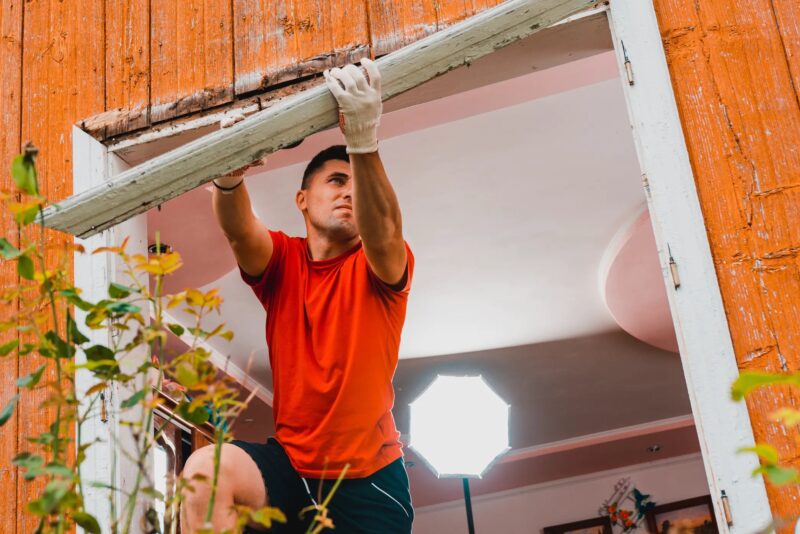
Consider the pros and cons of DIY window replacement versus hiring a professional.
Benefits and Risks of the DIY Approach
Window replacement is a DIY-friendly project, as long as you have a few basic skills. You can save a lot of money by replacing the windows in your home by yourself.
The only downside is that window replacement is more time-consuming for DIYers, and if you have multiple windows to replace, it might be better to hire a professional.
The Value of Professional Assessment and Installation
Hiring a professional for window replacement offers several advantages. One benefit is that you can take advantage of the professional advice offered by a window installer.
Professional window installation companies provide flawless installation, and they are able to put in a new window much more quickly than most home DIYers.
Weighing Costs, Time, and End Result Quality
Generally, professionals will provide a superior installation, but it will cost more. Whether you DIY or hire a professional to replace your windows, it’s a matter of personal preference and balancing out your time with the extra expense of hiring someone.
How to Save Money on Window Replacement

Bulk purchases for multiple window replacements– You might be tempted to replace one or two windows at a time or as your budget allows, but multiple window replacements will cost you less in the long run.
Utilizing tax credits for energy-efficient windows– Take advantage of tax credits by installing new energy-efficient windows in your home.
Shopping during promotional periods or off-season– Ask your window installer about off-season installation discounts, and keep your eye out for promotions from large retailers like Home Depot or Lowe’s.
Routine maintenance to extend window lifespan– Routine window maintenance, including inspections, sealing gaps, and lubricating window tracks, can make your windows last longer and reduce replacement costs.
Making an Informed Decision on Window Replacement
Several factors must be considered when determining if it’s time to replace your windows. Ultimately, new windows can make your home more comfortable, improve its appearance, and save money on your heating and cooling costs. For many, it’s worth the expense to enjoy these benefits.
Frequently Asked Questions About Window Replacement
How often should windows be replaced?
Windows have an average lifespan of 15 to 20 years. After that, the seals start to fail and begin to leak, causing foggy windows and drafts.
Do energy-efficient windows really save money in the long run?
The average energy savings of installing new windows is about 12% of your energy costs. Depending on where you live and how inefficient your current windows are, new windows can pay for themselves in the long run.
How long does window installation typically take?
Most window companies can install a new window in under an hour. If you have all of the windows in your house replaced, many will be able to install up to 15 per day. Ordering windows takes the longest, with most orders arriving in about one to two months.
Can I replace windows in any season?
You can replace windows in any season, but replacing windows during the warmer months is much more comfortable. You may also enjoy off-season savings by having your windows replaced during the winter.
How do I know if my windows need replacement or just repair?
Repairing windows is much less costly than replacing them. There are several cases where repairing them is the best choice, including If the caulking is damaged, the sash is sticking, or there’s chipping paint. Replacing them is a better option if you have foggy windows, which means the seal is broken.

